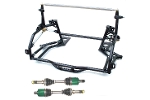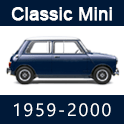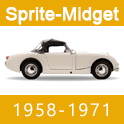MTK Installation Manual for Classic Mini (1959-2001)
V-Tec Conversion Kit below.
We welcome you to the Honda Powered Mini World. Thank you and congratulations for your purchase. You can be certain that you have made a wise choice with this upgrade.
This kit was designed to help put you on the right track when building your ultimate Mini. With the help of this MTK Kit, you will soon be driving your super-fast Mini.
Over the course of its existence, the Mini has been produced in numerous varieties, with numerous tiny "tweaks" and different build quality. It's impossible to account for all of these differences, and some of them will be unique to your vehicle. Furthermore, given everything that has happened to your car over the years, it is at least 15 years old. All of this being said, your MTK kit and these instructions are meant to account for some of these variations. Others will require you to "field fit" or alter as you go. We'll do everything we can to keep your project on track.
Please keep in mind that pictures will be of great help, so if you don’t have a digital camera, (or always wanted one,) now is a good time to get one. In fact, you should take LOTS of pictures to document your project.
Your project may seem overwhelming at times, but if you take it one step at a time, in a logical sequence, and take an occasional break from it, you’ll do great.
The goal of this kit is to make installing Honda VTEC as simple as possible. We've taken all of the research and development difficulties out of the installation so you don't have to. The automobile is attached to the sub-frame. The engine is secured in place by the sub-frame. You'll be ready to crank and drive your Super Fast Mini after a few more simple connections. From start to finish, we've split down the VTEC Mini construction into stages.
We hope that this will be a pleasurable experience for you and we will do everything that we can to make it that. Remember, we are available to help you 5 days a week. Just give us a call or drop us an email.
Thanks, and have fun!
MTK Contents
This Section contains a list and description of the parts included in the MTK Kit, and a list of parts that you will need in addition to the MTK Kit.
MTK Kit Includes:
- MTK Subframe
- Upper Suspension Arms
- Adjustable Lower Suspension Arms
- Rear Transmission Stabilizer
- Front Stabilizer Bar
- Engine Mounting Bracket
- Engine Mounting Spacer (2)
- Transmission Adaptor Bracket
- Lower Cross Member
- Extended Steering Arms
- Mounting Hardware
- 2 Mini/Honda Chromoly Axle Shafts
Additional Parts Needed for your MTK Kit:
- Honda K series engine/transmission (See List on pages 15 and 16)
- Coil-over shocks (#511200)
- Front disc brake system such as Mini Tec’s Superbrakes, Mini 8.4” disc brakes, other…
- Wheels with a –7mm offset to the outside (needed for turning radius clearance) or 1” wheel spacers
- Honda engine, ECU, and dash wiring harness
- Modified Honda ECU or engine management system
- Electronic speedometer - a mechanically driven Mini speedometer will not work with the Honda
- Modified Honda Civic radiator or Mini Tec’s MTK aluminum radiator kit (#511400)
- Honda shifter
- Honda B series engine and transmission mounts. Use aftermarket polyurethane mounts.
Preparation for Installation
Step 1: Remove stock Mini engine and subframe from Mini. Then, remove everything else in the engine compartment.
Step 2: Whether you use Mini Tec’s MT Flip Front End Kit or you do an extension yourself, you will need to cut existing Mini front end after the a-panel seam to remove existing Mini front. See Figure 1-2. Note: For extended metal front ends, it is best to attach the MTK subframe first before performing any body extensions.
Step 3: Clean, Prepare, and Prime the cars firewall and all rough surfaces (See Figure 1-3). Note: Add additional metal for extra stiffness to the front side of the a-panel as shown in the photo below. A guide tab on the inside of the a-panel will help align the MT Flip Front End as it closes.
Step 3: Cut out metal just below stock shock mount. This is needed to fit the MTK subframe (See following two photos).
Your Mini should now be prepared for the installation process.
Subframe assembly *Supplied with kit
Step 1: Attach upper bump stops. Mini bump stops with the single stud will work here.
Step 2: Attach the subframe to the car using the two large subframe mounting bolts just like the standard Mini subframe. If your car is an earlier model and does not have these two large ¾” diameter bolts, then you will need Mini Tec’s MK1/2 Subframe Mounting Kit (#351000). Standard Mini mounting bolts are circled in red in the following photo. Do not tighten completely at this point. You will need to attach the subframe and the bottom first.
Step 3: Drill six holes to support the bottom of the subframe using a 5/16” drill bit. Use the six supplied 5/16” bolts with plates to fasten the subframe to the car on the lower side. The plates will go inside of the car to give the floor panel extra support. After the six bolts are in place and tightened, tighten the two large subframe mounting bolts on top of the frame. See photos.
Your subframe should now be attached to your Mini.
Installing Engine into Subframe:
Step 1: Drill stock B Series Honda engine and transmission mounts to ½”.
Step 2: Attach supplied transmission mount adaptor plate using the supplied hardware in the sequence that it is attached to the plate. Then attach Honda B Series transmission mount to transmission.
Step 3: Attach Honda B Series engine mount (#210280) to MTK frame as shown. Make sure that your mount is for a Honda DC chassis.
Step 4: Attach MTK engine mounting bracket to engine block as shown. For some engines, you will need to use the supplied spacer plates for clearance.
Step 5: Lower engine into subframe and attach it with the hardware provided.
Step 6: Connect rear engine stabilizer to transmission as it is aligned on frame.
Step 7: Connect and tighten front engine stabilizer bar as it is aligned on frame.
Axles: Assembly and Installation
Parts needed for Assembly: *Chromoly Axle Shafts, Complete Inner Honda CV Joint Assemblies, and Complete Outer Mini CV Joint Assemblies. (See Photo Below)
Step 1: Assemble small end of axle shaft with the Mini cv joint assembly as done on a stock Mini but replace ball bearing gear with supplied gear.
Honda Axle End Assembly: Assemble large splinned side of axle with the Honda cv joint assembly. (See following four Photos)
Axle Installation: Simply slide one of the axles into the transmission and the other into the engine mid-shaft until the axles lock into place.
Swivel Hubs and Brakes:
Install the Swivel Hubs and Brakes as done on stock Mini. Replace Mini steering arm with the *Extended Steering Arm. Route all brake lines along the contour of the MTK Subframe.
Coil-Over Shock Installation:
Step 1: Attach lower side of shock as shown in photos.
Step 2: Attach top shock to upper strut mount. See Photo.
Fuel System modification:
Change your fuel pump to one that ranges from 32 to 48 PSI. A return line will be needed on certain models that do not have them. An inline fuel pressure regulator will also be required to set your system at 45psi.
Cooling System modification:
The MTK Subframe is designed to use the Honda Civic radiator 1992 – 1998 model but slightly modified. The bottom port must be cut off and relocated to the bottom side of the radiator. There are two tabs located on the front of the subframe for mounting this radiator.
Alternative: Mini Tec MTK Aluminum Radiator Kit comes with everything you need to keep your Honda Mini running at the correct operating temperature. Items included are: Aluminum radiator, radiator fan, radiator hoses, and a catch can.
Compatible Engines: Here is a list of available Honda engines that you can use with your MTK Kit.
- K20A Found in:
- 2001-2005 Honda Civic Type-R (EP3)
- Displacement: 1998 cc
- Compression: 11.5:1
- Power: 212 hp (215 PS, 158 kW) @ 8000 rpm
- Torque: 149 ft·lbf (202 N·m) @ 7000 rpm
- Redline: 8400 rpm
- 2001-2006 Honda Integra Type-R (DC5)
- Displacement: 1998 cc
- Compression: 11.5:1
- Power: 217 hp (220 PS, 162 kW) @ 8000 rpm
- Torque: 152 ft·lbf (206 N·m) @ 7000 rpm
- Redline: 8500 rpm
- 2002-2006 Honda Accord Euro-R
- Displacement: 1998 cc
- Compression: 11.5:1
- Power: 217 hp (220 PS, 162 kW) @ 8000 rpm
- Torque: 152 ft·lbf (206 N·m) @ 7000 rpm
- Redline: 8500 rpm
- K20A2Found in:
- 2002-2004 Acura RSX Type-S and 2002-2005 Honda Civic Type R (EP, European)
- Displacement: 1998 cc
- Compression: 11.0:1
- Power: 200 hp (147 kW) @ 7400 rpm
- Torque: 142 ft·lbf (193 N·m) @ 6000 rpm
- Redline: 8200 rpm
- K20A3 Found in:
- 2002-2005 Honda Civic Si
- Displacement: 1998 cc
- Compression: 9.8:1
- Power: 155 hp* (119 kW) @ 6500 rpm
- Torque: 139
- 2002-2006 Acura RSX
- Displacement: 1998 cc
- Compression: 9.8:1
- Power: 155 hp* (119 kW) @ 6500 rpm
- Torque: 139 ft·lbf* (191 N·m) @ 4000 rpm
- Redline: 6800 rpm
- (* Horsepower and torque calculations reflect new SAE J1349 procedures revised August 2004)
- 2002-2005 Honda Civic Si
- 2002-2004 Acura RSX Type-S and 2002-2005 Honda Civic Type R (EP, European)
- 2001-2005 Honda Civic Type-R (EP3)
Suspension Setup:
These figures are for daily driving. You may want to set up the car differently if planning on racing your Mini.
- Front Caster Setting = 2.5 to 3.5 Degrees (2.5 for a lighter steering wheel, 3.5 for a heavier steering wheel)
- Front Camber Setting = -0.5 to -1 Degree (Less for street driving, more for racing)
Check List:
For your safety, please check…
- That every suspension component is fastened tightly.
- That the steering system is fastened properly and all nuts and bolts are secure.
- For a firm brake pedal.
- That the engine is stationary.
- All fluid levels are full.
- Tires are inflated properly.
- All lug nuts are tight.
Test Drive:
For your first test drive, go slow and easy to make sure that there are no problems. Listen for odd noises as you drive the car. Drive the car easily for a few miles, and then go over the Check List again. After driving the car for 100 miles, check front suspension alignment. After that, have fun!
Disclaimer of Warranty
Neither the seller nor the manufacturer will be liable for any loss, damage or injury directly or indirectly arising from the use or inability to determine the use of these products. Before using, the user shall determine the suitability of the products for its intended use, and the user should assume full responsibility and risk in connection herewith. This product is intended for off road use only.








